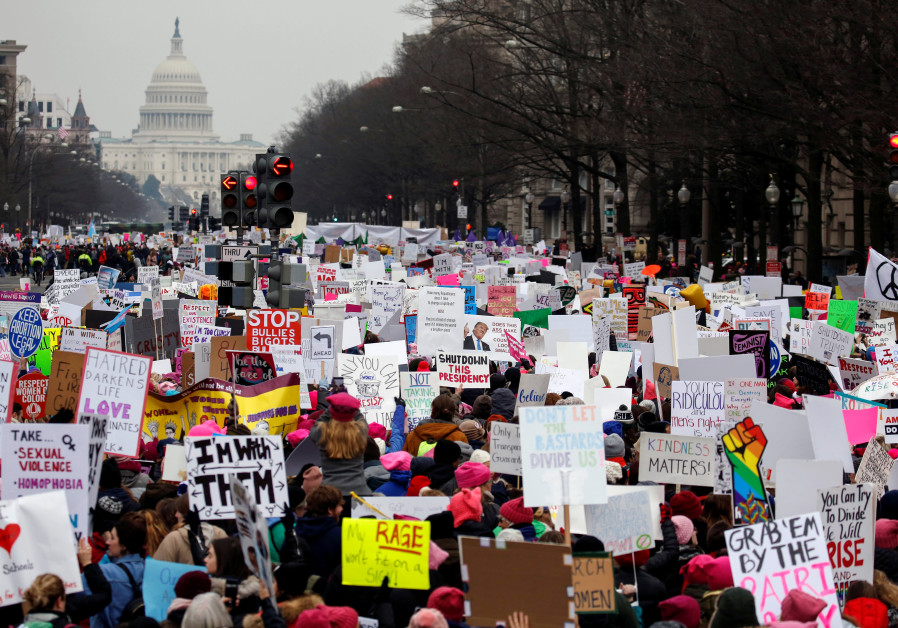Third Annual Women’s March Marked by Antisemitism among its leadership
Thousands of people participate in Third Annual Women’s March in Washington, US, January 19, 2019.. (photo credit: REUTERS/JOSHUA ROBERTS)
WASHINGTON – A national movement for women’s rights gathered for the third time in the capital on Saturday under cloudy skies and the shadow of an antisemitism crisis gripping its leadership.
Tens of thousands showed for the Washington event, paired with solidarity marches across the country. But turnout was muted compared to years past as organizers in Boston, New York, Chicago and Los Angeles bemoaned the organizational challenges caused by the refusal of Women’s March leaders to condemn all forms of antisemitism, and to recognize Israel’s right to exist as a Jewish state.
Tamika Mallory, Linda Sarsour and Carmen Perez – three of the original organizers of the activist event, which in 2017 culminated in the largest march in American history – repeatedly declined to condemn Louis Farrakhan in a series of interviews this week.
Farrakhan has called Jews his “termite” enemies and openly calls for Israel’s destruction. All three women have endorsed his politics in the recent past.
While the founder of the Women’s March last year called on its controversial cochairs to step down, they declined, and instead added to the official Women’s March agenda a defense of the boycott, divestment and sanctions movement of Israel.
The scandal forced Democrats who had proudly aligned themselves with the march in 2017 to distance themselves from the movement ahead of Saturday’s events. Few sitting lawmakers attended any of the marches, save for New York Sen. Kirsten Gillibrand, who conditioned her appearance at an Iowa march earlier in the week.
Gillibrand “strongly condemns antisemitism from anyone, in all forms, and believes it has no place in a movement for women’s empowerment or anywhere else,” said a spokesman for the senator, who last week announced her candidacy for the 2020 Democratic presidential nomination.
The Human Rights Campaign and Amnesty International disassociated themselves from the march this year, and even the Democratic National Committee removed itself from its list of partners. Speaker of the House Nancy Pelosi – the only woman ever to hold that position, third in line to the presidency – also declined to participate.
“While I still firmly believe in its values and mission, I cannot associate with the national march’s leaders and principles, which refuse to completely repudiate antisemitism and all forms of bigotry,” Debbie Wasserman Schultz, who once chaired the DNC and had marched in the past, said.
And national media coverage of Saturday’s events focused intensively on the antisemitism crisis, with CNN, The New York Times and The Washington Post, among others, leading their stories detailing the effects of the controversy on the movement.
Mallory, who two years ago posed for photos with Farrakhan after an antisemitic speech, appeared on The View on Monday and declined when pressed to condemn his remarks. “That is not my language,” she said.
Sarsour – who has come under fire herself for espousing antisemitism – defended Mallory on Friday, claiming that The View hosts had put her in a “difficult position” by pressing her to condemn Farrakhan.
“We understand that there will be schisms,” Sarsour told ABC News, acknowledging that the movement had requested access to smaller venues for their marchers this year. “There’s going to be hard conversations that need to be had. So we will work through this as a women’s movement because we are focused on what the real threat to this country is, and it is this administration and white supremacy.”
Later in the week, appearing with Margaret Hoover on PBS’s Firing Line, Mallory said Palestinians are “native to the land” of historic Palestine but declined to say the same of Jews in Israel. “I’m not Jewish,” she said.
“I have said many times that I feel everyone has a right to exist, I just don’t feel anyone has a right to exist at the disposal of another group,” Mallory said.
“Does that include Israel and Israelis?” Hoover pressed.
“I’m done talking about this,” Mallory replied.
